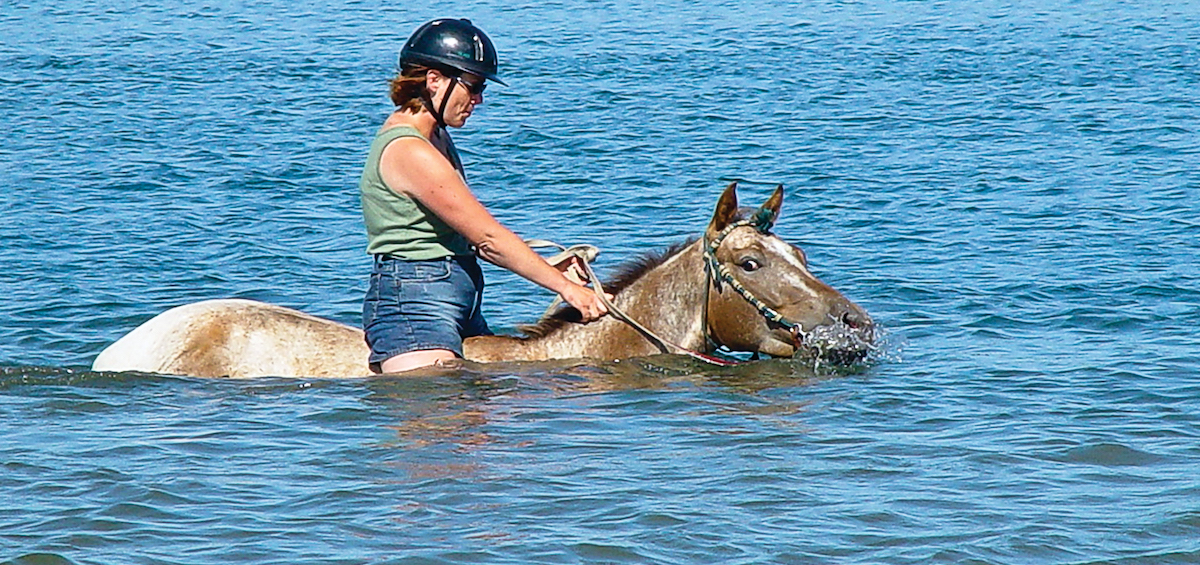
Swimming with your horse is great fun. I’ve done it several times with different horses over the years and have always had a blast. That feeling of half riding, half floating above your horse is exhilarating. Plus, in the warmest temperatures, you’ll find your horse just might enjoy it as much as you do.
I asked trainer Christy Wood, who has plenty of opportunity to take horses swimming in the lovely Three Rivers area of California where she lives, to share some of her expertise. If you’re thinking of enjoying this refreshing activity sometime during the summer, here’s how to maximize both fun and safety.
1. Plan Your Swimming Hole
It may be a river or lake near your home, or perhaps a horse-friendly ocean beach you can haul to. You’ll need water that’s deep enough to prompt swimming (that is, over your horse’s withers), but not too rough, swift, or cold. The time of year can play a part.
“I live on the North Fork of the Kaweah River, and I usually don’t try entering the water until late June,” says Christy. “Before then, the runoff from snow melt creates strong currents and too-cold temperatures.”
A sandy bottom is ideal. “Or you can remove problematic rocks by hand,” suggests Christy. “Take friends, and make a rock-moving party out of it.”
2. Prep Your Horse
“Don’t make your first time in the water your ‘swim meet,’” advises Christy. Allow your horse the opportunity to feel comfortable in water up to his belly before you ask him to swim in deeper water.
[RELATED: Introduce your horse to water crossings.]
3. Plan Your Gear
Bareback is ideal, or you can use an inexpensive bareback pad to alleviate some of the slipperiness.
“I always ride in a snaffle bit,” says Christy, “and I add a neck rope in case I lose my balance at any point. A nylon bridle is best, but a well-oiled leather one can work as well.”
A halter with reins attached is another option if your horse is controllable that way. Whatever you use, your horse’s head needs to be free to move to enable swimming, which means no tie-downs or martingales (which have actually been known to cause drownings).
As for you, the only essential gear is a safety helmet—because although water would cushion a fall, there’s the risk of getting hit by a churning hoof.
4. Don’t (Ever!) Swim Alone
Take at least one friend with you. Also, everyone in your swim party must know how to swim and be competent enough riders to control their horses while still having fun.
5. Pay Attention
Go slowly at first, and give your horse time to adjust to the feeling of buoyancy. He may plunge a bit at first, so grab mane or neck rope and be prepared. Keep a safe distance from others in your party and stay alert.
“If you get to giggling and not watching out for the other swimmers, you could have a few collisions,” cautions Christy. “That’s another reason why a snaffle or hackamore, with their milder direct-rein effect, are preferable to a shank bit.”
Check out this handy swimming gear on Amazon; bareback pad, nylon headstall, and a snaffle bit.
Products we feature have been selected by our editorial staff. If you make a purchase using the links included, we may earn a commission. For more information click here.
6. Don’t Overdo It
“Swimming can be exhausting for both horses and riders,” says Christy. “So use common sense—you want your horse to have a good experience with it, especially the first time.”
[RELATED: Why not to let your horse paw or ‘play’ in the water.]






